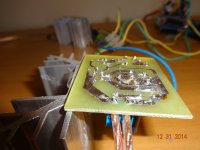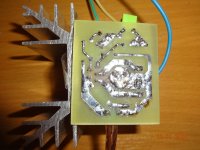Hello, I have built a LM1875 amp, on this pcb:

It is 2 pcb's and PSU assembled on air. It has been running fine for a week, but then I had to move it (it still doesn't have a case). And after moving it both chanells started to have high DC voltage at the outputs.
When the volume on my source (laptop) is below half (which was normal for listening before) I measure 17 V DC at the outputs and 0 V AC.
When I turn up the volume even more, DC voltage starts to drop and AC voltage appears.
Maybe someone knows what might be the problem?
BTW: PSU looks fine I measure normal +-18V coming from it.

It is 2 pcb's and PSU assembled on air. It has been running fine for a week, but then I had to move it (it still doesn't have a case). And after moving it both chanells started to have high DC voltage at the outputs.
When the volume on my source (laptop) is below half (which was normal for listening before) I measure 17 V DC at the outputs and 0 V AC.
When I turn up the volume even more, DC voltage starts to drop and AC voltage appears.
Maybe someone knows what might be the problem?
BTW: PSU looks fine I measure normal +-18V coming from it.
Something has broken during the move.
A broken wire, or a broken solder, or a broken trace. Or maybe a loose strand of wire has shorted across a couple of pads/traces?
You need to check more thoroughly.
The 330uF feedback capacitor seems to be too big.
What Low Frequency cut off do you want for the signal that passes to the speaker?
At the moment you have 1uF and 10k as the High Pass input filter.
The 220pF for the Low Pass filter is not well defined.
A broken wire, or a broken solder, or a broken trace. Or maybe a loose strand of wire has shorted across a couple of pads/traces?
You need to check more thoroughly.
The 330uF feedback capacitor seems to be too big.
What Low Frequency cut off do you want for the signal that passes to the speaker?
At the moment you have 1uF and 10k as the High Pass input filter.
The 220pF for the Low Pass filter is not well defined.
Last edited:
The formula I use is:
NFB cap value >= Input cap value * sqrt(2) * Rin value / NFB lower resistor value.
for your PCB I see Input cap = 1uF, Rin = 10k, NFB R = 1k5.
gives NFB >= 1u *1.4 * 10k / 1k5 >= 9u4F
22uF meets that requirement.
But 1uF & 10k limit your bass passing through.
That formula is posted many times on this Forum, looks like you found it.
NFB cap value >= Input cap value * sqrt(2) * Rin value / NFB lower resistor value.
for your PCB I see Input cap = 1uF, Rin = 10k, NFB R = 1k5.
gives NFB >= 1u *1.4 * 10k / 1k5 >= 9u4F
22uF meets that requirement.
But 1uF & 10k limit your bass passing through.
That formula is posted many times on this Forum, looks like you found it.
AndrewT, thanks for your replies.
I calculated cutoff frequency of 16hz with 1uF and 10K. Or am I wrong?
I calculated cutoff frequency of 16hz with 1uF and 10K. Or am I wrong?
You can use 16Hz for the input filter.
It starts to have an effect @ ~10times that frequency, but way up here the effect on response is very small. It affects phase a bit more, but still inconsequential.
At 5times, the changes due to the filter are becoming detectable.
At 2 times, the changes are audible and many (myself included) detect a loss of bass performance even with small speakers.
I eventually adopted <2Hz after finding that I could hear a change when moving from F-3dB @ 8Hz to 4Hz. I preferred the sound effects using 4Hz and then added a factor of safety of one octave.
I will admit that with small speakers I cannot hear the difference between 1.6Hz and 4Hz
At that time my only pair of big speakers were non operational. I should go back and re-do the experiments with some of the big speakers I now have.
It starts to have an effect @ ~10times that frequency, but way up here the effect on response is very small. It affects phase a bit more, but still inconsequential.
At 5times, the changes due to the filter are becoming detectable.
At 2 times, the changes are audible and many (myself included) detect a loss of bass performance even with small speakers.
I eventually adopted <2Hz after finding that I could hear a change when moving from F-3dB @ 8Hz to 4Hz. I preferred the sound effects using 4Hz and then added a factor of safety of one octave.
I will admit that with small speakers I cannot hear the difference between 1.6Hz and 4Hz
At that time my only pair of big speakers were non operational. I should go back and re-do the experiments with some of the big speakers I now have.
Last edited:
Your problem may be different but I built this same circuit for two amplifiers and had troubles with both, mine ended up consistently blowing the fuses on the negative rails in both cases, and it was maddening.
Turns out the problem was the LM1875s weren't adequately insulated from the heatsinks. Since I fixed that no problems.
Turns out the problem was the LM1875s weren't adequately insulated from the heatsinks. Since I fixed that no problems.
- Status
- Not open for further replies.
- Home
- Amplifiers
- Chip Amps
- High DC voltage at the output (LM1875)

